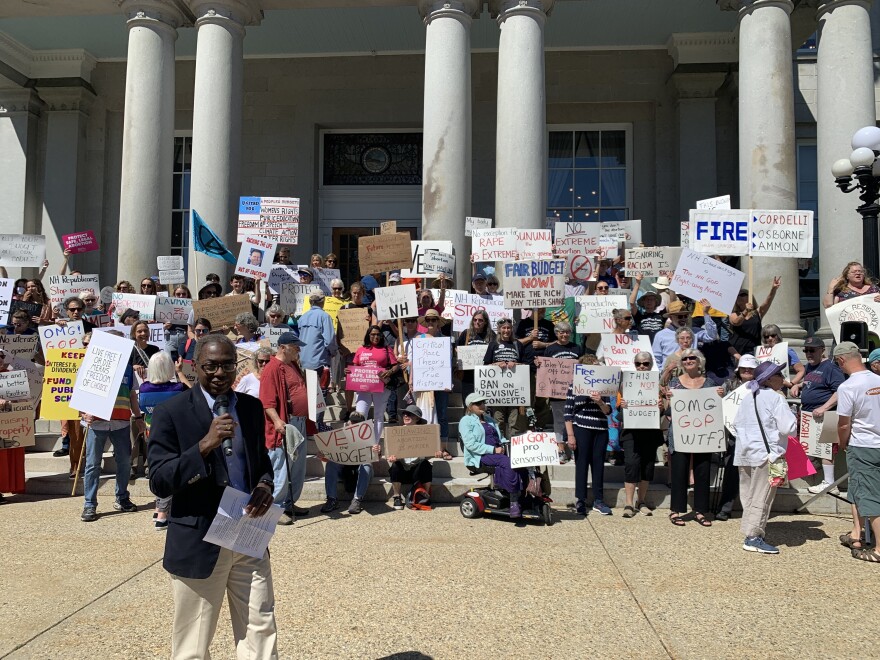The year began with the roll-out of COVID-19 vaccinations and renewed hopes. And it’s ending with some of the highest coronavirus numbers since the first patient in New Hampshire was identified in March of 2020.
To reflect on the year in local news, NHPR Morning Edition host Rick Ganley invited a few reporters whose beats dominated the headlines. Health reporter Alli Fam, education reporter Sarah Gibson and political reporter Josh Rogers reviewed the defining moments of 2021.
Guests:
- Alli Fam, NHPR
- Sarah Gibson, NHPR
- Josh Rogers, NHPR
Transcript:
Rick Ganley: It seems like education, politics and health. We're all tangled up in each other during the pandemic. Sarah, how has COVID changed the education beat?
Sarah Gibson: Oh, how has it not changed the education beat I think is the question. I mean, it's completely reshaped schools in the United States, as well as the political debates around schools. School board meetings have really become the site for political fights and the nation's culture wars in the past year.
There are a couple reasons for that. One is that it was school boards in New Hampshire that were deciding a lot of the COVID mitigation measures. So if you were upset about the fact that your kid was wearing a mask, if you were upset about the fact that school was still remote while the district nearby was fully in person last year, the person you're going to go to to complain about it, and try to make change, is your school board member, your superintendent. So school board meetings became really heated over the course of the pandemic.
And you know, COVID is political: people's risk tolerance, their belief in the severity of the pandemic is influenced by their party affiliation, the media they consume. And so we really saw that play out in what kind of COVID mitigation measures parents and community members were advocating for or against at school boards across the state and frankly, the country.
Sarah Gibson: You know, the other thing that really happened was that parents mobilized around remote learning and hybrid learning that happened last year. A lot of parents were really upset that it took districts a long time to figure out an in-person option, while other parents wanted a remote option all of last year and were, you know, advocating for their kids to be able to stay home but receive a high quality education because of health concerns.
So schools had to really contend with a lot of competing requests and needs from students as well as their parents. And you know what we saw, as well, in terms of the kind of importance of the education beat this past year is that it showed up a lot in the State House debates. So everything from expanding school choice to whether or not vaccines should be required to whether or not masks should be required. Those are all highly contested debates that we saw play out in the State House as well, and we will see again in 2022.
Rick Ganley: Yeah, it's going to continue for sure. Josh, your work closely followed the anti-mask and anti-vaccine activism this year. How have you seen that movement grow?
Josh Rogers: Well, it's been ad hoc, but also organized. You know, this has been going on for a while. I mean, its origins really were in the executive order that the governor issued about the state of emergency. And you had protesters outside his house protesting those limits that prompted him to forego a public inaugural. Then when he let the state of emergency expire, I think a lot of people figured that was going to go away. You know, it didn't.
A telling moment for me was in September, when Republican leaders in the New Hampshire House planned to hold a State House Plaza press conference, taking aim at the announcement from President Joe Biden that there was going to be a federal mask mandate issued through OSHA for employers of a certain size. And, you know, Republicans set up a podium and there were also COVID restriction/anti-vaccine protesters there, and [Republicans] carried on as if this was kind of a normal partisan political moment where you would say, "We stand for individual liberty. Democrats in Washington, President Biden do not live free or die."
And you had anti-vaccine activists heckling the Republicans, calling out Governor Sununu. At one point, you had House Speaker Sherman Packard yelling at protesters, "You're yelling at the wrong people. We're trying to help you."
Josh Rogers: And you know, for me, that was a telling moment about simply the tenor of the movement, but also the challenges that Republicans have in dealing with these people, which isn't to say that a lot of their beliefs aren't shared by some elected Republican officials.
You recall Ken Weyler, the former House finance chairman, he made some pretty outlandish claims about COVID vaccines as both the health effects of them and the notion that they are somehow an effort for government control over individuals. The interesting thing is the energy within the COVID resistance movement, I guess you could call it, as something that animates a lot of conservatives on the street as well as some inside the legislature.
And we all know we still have the lowest rate of vaccination in the region, and it'll be interesting to see going forward what shape this takes. I mean, as Sarah mentioned, there's going to be many bills debating on the education front, on the vaccine mandate front, on what you could call the medical liberty front. That's going to inform a lot of the politics over the next year.
Rick Ganley: Well, and we have Republicans in control of the state House of Representatives [and] the Senate this year, as well. How did the new leadership handle the pandemic compared to how it was handled before that?
Josh Rogers: Well, when the pandemic first arrived, Democrats were in charge. They tried to essentially finish up, find a good ending point. They left, the State House was closed, the governor has emergency powers. There was sort of a partisan dynamic where the governor was able to use his emergency powers to bypass a lot of oversight from Democrats.
Republicans got elected. You know, Speaker Dick Hinch was installed and within days he died of COVID. That was a really strange and dark moment at the State House, and a pretty serious turn. And Republicans in the House in particular have taken some steps to promote safety, but they've never required members to wear masks. And they've also fought efforts by Democrats to allow remote participation in sessions by people who are medically fragile, who are elected lawmakers. And so the House has met in sports arenas, in a parking lot and a kind of a drive-in movie-style thing. It's been weird when they get together. There was hope that they could return to business as usual at the State House. But now in January, the first few session days are going to be held at a hotel function room.
Rick Ganley: And some still want that remote option.
Josh Rogers: Well, it's a subject of a federal lawsuit, but you know, during that time of the challenge of the organizational aspect of the House, the Republicans remained incredibly unified, passing an array of conservative policies in areas that touch the pandemic and in areas that don't, from the budget [to] restrictions on abortion. And they stayed unified in a way that perhaps was furthered by the weird aspect of how they had to operate. And a lot of these issues are going to come back when the Legislature convenes in January.
Rick Ganley: Alli, how did New Hampshire compare with other states and how it fared with COVID 19 over the year?
Alli Fam: I mean, this has really changed over the course of the year. I think early on, New Hampshire saw a lot of the spikes and surges that the rest of the country did, but we didn't necessarily reach, you know, the crisis level that states in the South saw in the late summer.
That, though, has changed more recently. I think that the FEMA teams who are coming into New Hampshire hospitals right now, so those are federal staffers to help shore up our health care system, are pretty emblematic of the fact that we're in a severe crisis and that we're a place that needs that extra help right now.
You know, a couple of weeks ago New Hampshire was leading the nation in daily new case rates. So these days I think we're looking worse than some states. That could change very soon with Omicron. I mean, New York City's cases have already skyrocketed.
Rick Ganley: What we're seeing essentially is the aftermath of the Delta variant spreading through the population.
Alli Fam: Right we're still seeing that here.
Rick Ganley: Well, the controversies weren't all about COVID in this past year. I know Governor Sununu signed a law that restricts how educators in New Hampshire can teach topics like racism and sexism. Sarah, how has that impacted teachers and students?
Sarah Gibson: Well, that's a big question. So when the law was signed this summer, a lot of its critics said this law is so vague. The language about what books and what discussions are allowed and aren't allowed regarding systemic racism and the legacy of racism in this country, it's so unclear that teachers are going to basically self-censor. That there are going to be certain conversations that technically maybe are allowed, but that they just don't engage with because they're scared of having a target on their back of there being a complaint lodged against them and then them losing their license.
Rick Ganley: Essentially saying it's a chilling effect.
Sarah Gibson: Exactly. And so I've definitely heard some examples of that happening. But what I've heard mostly is teachers just saying there's a culture and climate of fear, particularly among social studies and history teachers and English teachers around what they're allowed to discuss and whether or not they'll get targeted by parents who believe that they're indoctrinating students.
So I don't know if that's shifting everyone's curriculum as much as it is shifting morale among teachers. And actually, you know that question, to what extent is this law impacting teachers and students, is now in the courts. There are two federal lawsuits filed this month by the two major teachers’ unions in New Hampshire, basically alleging that this law is having a chilling effect and that it denies teachers constitutional rights to due process
Sarah Gibson: So again, those lawsuits [were] just filed recently, and we'll see how they play out in the courts next year.
Rick Ganley: It's Morning Edition here on NHPR. We are reviewing the news of the year with NHPR reporters Alli Fam, Sarah Gibson and Josh Rogers. All right, I want to hear from all of you on this very important question: how would you describe 2021 in one sentence. Josh?
Josh Rogers: I feel like I scarcely remember what's happened, but I'm now confident that we are in the same place.
Rick Ganley: It's a fire hose of news, I know. How about you, Alli?
Alli Fam: Secretly worse than 2020.
Rick Ganley: Hmm. And you, Sarah?
Sarah Gibson: Uh oh.
Rick Ganley: Is that technically a word or a sentence?
Sarah Gibson: I'm going to say it captures 2021 for me.
Rick Ganley: Yeah, I think it's probably a pretty good way to put it. Well, "uh oh" may describe the year very well, but I want to end this on a high note, if I could. Sarah, what brought you joy this year?
Sarah Gibson: Ok, so in work what brought me joy was exploring an outdoor classroom there. These have popped up during the pandemic in order to let kids be outside, explore the outdoors and not worry as much about COVID transmission. And it was truly inspiring for me to visit some of these and hang out with kids outdoors. And then also what brought me joy outside of work is that I spent a fair amount of the pandemic attending online dance parties with my friends on Zoom, and it was pretty glorious.
Rick Ganley: How about you, Alli?
Alli Fam: I think in the news, one thing that's brought me joy is I've been working on a series called Overtime, where we've been following six New Hampshire women, and it's been a joy to check in with them kind of again and again. And the last couple of months we've had some really bright stories. Most recently, I went to the opening of Wild Orchid Bakery, which is run by Shelly-Anne Storer, who is one of the women in that series. And it was so meaningful to see her open this bakery in the exact location that a year ago she told me felt so out of reach and was worried it might never happen.
Rick Ganley: Yeah, good news, and we need that.
Alli Fam: Personally, what brought me joy is a pasta maker.
Rick Ganley: Oh all right. Pasta and some good news stories definitely. How about you, Josh?
Josh Rogers: I tend to consider joy outside the context of work. I had some nice times this year swimming in the ocean with my family. I have a dog so watching him run through the woods. I mean, it's pretty good, pretty wholesome stuff.










